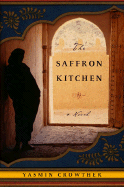
I hate to break into my annual allotment of "luminous" so early in the year, but am forced to after reading The Saffron Kitchen. I might as well throw in "spellbinding" and "poignant" too. Yasmin Crowther's debut--a story of love, family, exile and yearning--is a marvelous addition to the literature about Iran and Iranian émigrés, and to fiction in general.
 Maryam Mazur was a teenager in the Iranian city of Mashhad in the early 1950s, full of life and strong-willed, the daughter of a Shah-supporting general. As a girl, she longed for something other than an arranged marriage--perhaps love, certainly an education as a teacher or nurse. After an unfortunate and misunderstood incident, her father, believing the family honor compromised, brutally punished her and banished her to Tehran. She then moved to England, where she married and had a daughter, Sara. Three decades later, when her nephew Saeed arrives to live with her and her husband, he brings memories and a long-suppressed rage to the surface, with tragic consequences. With Sara in the hospital and her nephew afraid of her, she believes she doesn't deserve her family and leaves England for Iran. She travels to the village of Mazareh, where she had spent her summers, where she had been young and hopeful, "where life had been redeemable."
Maryam Mazur was a teenager in the Iranian city of Mashhad in the early 1950s, full of life and strong-willed, the daughter of a Shah-supporting general. As a girl, she longed for something other than an arranged marriage--perhaps love, certainly an education as a teacher or nurse. After an unfortunate and misunderstood incident, her father, believing the family honor compromised, brutally punished her and banished her to Tehran. She then moved to England, where she married and had a daughter, Sara. Three decades later, when her nephew Saeed arrives to live with her and her husband, he brings memories and a long-suppressed rage to the surface, with tragic consequences. With Sara in the hospital and her nephew afraid of her, she believes she doesn't deserve her family and leaves England for Iran. She travels to the village of Mazareh, where she had spent her summers, where she had been young and hopeful, "where life had been redeemable."When Maryam gets to Iran, she says that while she had run away from her past, "it has been inside me all along, and now it has brought me back here." In London, she felt that she was removed from life, always looking to see how she fit in, how things were done. "We never really escape. All I ever wanted as a child, a young woman, was to be free of etiquette and tradition, arranged marriages and everything just so. All I found was another world where I had to work out the new traditions, habits, how to appear just so. Isn't it silly?" The paradox is that Maryam had to leave Iran to breathe, but then has to return to keep breathing.
Yasmin Crowther has a deft way with description, making the cold, dusty plains of northern Iran an intriguing place, both mysterious and welcoming. Maryam's happy childhood memories of "amber honey, marbled with bees' wings and broken torsos," of tea and samovars, are beautifully and sparely rendered: "Low sunbeams fell through the half-open door and cast long shadows on the hearth and tiled floor, scattered with fallen onion skins and coriander stems. A black cauldron of rice bubbled slowly and filled the air with soft, starchy warmth, while two chickens turned gold on the spit." Her tragic memories are a stark counterpoint to that warmth and security. The story moves between the present and the past, and both come together when Sara journeys to Mazareh to find her mother. To Sara, the village in winter is cold and desolate, with mud houses, the stink of animals. To her mother, it is a place to reclaim her life and her past, to feel "the slow restitching of time begin." The difficult passage of both Maryam and Sara into understanding and healing will captivate the reader.--Marilyn Dahl

